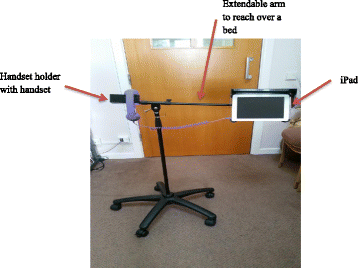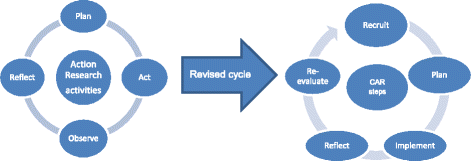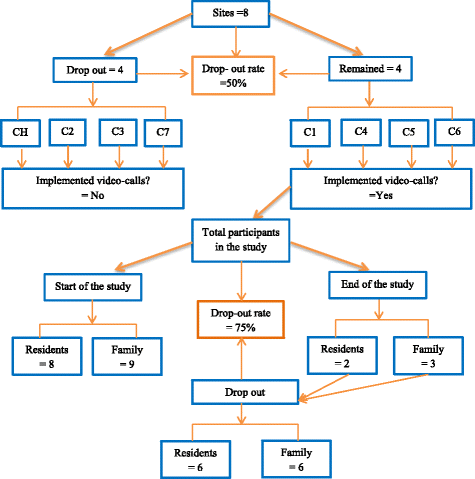Video-calls to reduce loneliness and social isolation within care environments for older people: an implementation study using collaborative action research
- PMID: 29499659
- PMCID: PMC5833092
- DOI: 10.1186/s12877-018-0746-y
Video-calls to reduce loneliness and social isolation within care environments for older people: an implementation study using collaborative action research
Abstract
Background: Older people in care may be lonely with insufficient contact if families are unable to visit. Face-to-face contact through video-calls may help reduce loneliness, but little is known about the processes of engaging people in care environments in using video-calls. We aimed to identify the barriers to and facilitators of implementing video-calls for older people in care environments.
Methods: A collaborative action research (CAR) approach was taken to implement a video-call intervention in care environments. We undertook five steps of recruitment, planning, implementation, reflection and re-evaluation, in seven care homes and one hospital in the UK. The video-call intervention 'Skype on Wheels' (SoW) comprised a wheeled device that could hold an iPad and handset, and used Skype to provide a free video-call service. Care staff were collaborators who implemented the intervention within the care-setting by agreeing the intervention, recruiting older people and their family, and setting up video-calls. Field notes and reflective diaries on observations and conversations with staff, older people and family were maintained over 15 months, and analysed using thematic analysis.
Results: Four care homes implemented the intervention. Eight older people with their respective social contacts made use of video-calls. Older people were able to use SoW with assistance from staff, and enjoyed the use of video-calls to stay better connected with family. However five barriers towards implementation included staff turnover, risk averseness, the SoW design, lack of family commitment and staff attitudes regarding technology.
Conclusions: The SoW intervention, or something similar, could aid older people to stay better connected with their families in care environments, but if implemented as part of a rigorous evaluation, then co-production of the intervention at each recruitment site may be needed to overcome barriers and maximise engagement.
Keywords: Action; Care-settings; Collaborative; Elderly loneliness; Intervention; Isolation; Research; Skype; Video-calls.
Conflict of interest statement
Ethics approval and consent to participate
The study was approved by the Plymouth University ethics committee in December 2013 and NHS in March 2014. Patients and staff gave written consent. Information sheets were read to patients by the researcher or staff. Staff were given information sheets in the staff training sessions before SoW was presented. Residents gave verbal consent to staff and the researcher; staff noted this down and kept the information on site. The information sheet and leaflet was read to residents by staff or the researcher. The feedback sheet included an item asking staff if residents are happy to continue with participation after each Skype call. Care home staff gave verbal consent and were given an information sheet and leaflet. Family members were emailed an information sheet, leaflet and consent form to return. Patients and residents informed staff or the researcher if they did not want to continue to participate. All participants had access to RJ, and the board of committee contact if they wished to cease participation, or informed SZ.
Consent for publication
All participants and staff were made aware that conversations between them and the researcher would be noted, and quotes may be published in anonymised form unless they informed the researcher otherwise. This was explained verbally by SZ or by staff to residents and families. Consent sheets given to patients, staff and family also explained this. All participants and staffs were able to give consent. Only direct face-to-face or telephone conversations with SZ were noted and used as anonymous quotes. These included; NHS staff, care home managers or activity co-ordinators at each site that were appointed co-researchers and patients who gave their written consent for anonymised quotes.
Competing interests
The authors declare that they have no competing interests.
Publisher’s Note
Springer Nature remains neutral with regard to jurisdictional claims in published maps and institutional affiliations.
Figures
References
-
- Mountain GA, Hind D, Gossage-Worrall R, Walters SJ, Duncan R, Newbould L, Rex S, Jones C, Bowling A, Cattan M, et al. 'Putting life in Years' (PLINY) telephone friendship groups research study: pilot randomised controlled trial. Trials. 2014;15:141. doi: 10.1186/1745-6215-15-141. - DOI - PMC - PubMed
-
- Cattan M, Kime N, Bagnall A-M. The use of telephone befriending in low level support for socially isolated older people - an evaluation. Health & Social Care in the Community. 2011;19(2):198–206. - PubMed
Publication types
MeSH terms
LinkOut - more resources
Full Text Sources
Other Literature Sources
Miscellaneous




